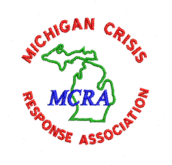Michigan Crisis Response Association, Inc.
MCRA is a voluntary association and therefore we don’t have any offices or staff. All people involved with MCRA volunteer their time. The best way to get in touch is to email us at the email address listed.Contact us
for Emergency Callout - 1 800 969 0025 Calls answered by Life Care Ambulance in Battle Creek info@mcrainc.comOur Mission Statement
MCRA's mission is to promote, facilitate, and support the activities, operations, and training of agencies and response teams that are involved in critical incident stress management. To fulfill this mission the MCRA will: • Assist communities in identifying groups that are at risk of experiencing traumatic stress. • Develop training for service providers who would reach out to traumatized groups. • Assist communities in developing crisis response plans. • Provide support to local resources. • Maintain contact with local crisis response teams throughout Michigan. MCRA will accomplish this mission in a manner which respects the autonomy of each community and the need for each community to be in control of its own recovery.
About MCRA
Our History The Michigan Crisis Response Association (MCRA) was formed in 1988 and was originally founded as the Michigan Crisis Response Team. MCRA was created in response to the need for mental health support following critical incidents in our communities. Research and the experience gained from the response to the crash of Flight 255, and other less dramatic community crisis, have made it clear that first responders and community residents can be helped to manage their stress reactions following events such as these. MCRA is a cooperative effort of response teams that include; personnel from law enforcement, fire services, social services, prosecutors, emergency medical teams and mental health agencies throughout Michigan. MCRA follows the International Critical Incident Stress Foundation (ICISF) model developed by Dr. Jeffrey T. Mitchell. Mitchell and his colleagues have conceived a comprehensive and integrated response program designed to provide crisis intervention to those impacted by traumatic events. Called Critical Incident Stress Management (CISM), it was originally termed Critical Incident Stress Debriefing (CISD), and referred solely to a structured 7-phase discussion of the traumatic event. It was the primary means to address trauma among first responders. Increasingly, the need for other and more comprehensive intervention strategies has been recognized. Additionally, special response methods for the traumatic events that effect community groups such as schools and neighborhoods have been developed. CISM interventions now help first responders and communities in a variety of ways and research has demonstrated the positive effect early intervention has on symptom reduction, length of recovery, and the ability to resume one's usual level of functioning.
Michigan Crisis Response Association, Inc. - 2024
Michigan Crisis Response Association, Inc.
MCRA is a voluntary association and therefore we don’t have any offices or staff. All people involved with MCRA volunteer their time. The best way to get in touch is to email us at the email address listed.Contact us
for Emergency Callout - 1 800 969 0025 Calls answered by Life Care Ambulance in Battle Creek info@mcrainc.comOur Mission Statement
MCRA's mission is to promote, facilitate, and support the activities, operations, and training of agencies and response teams that are involved in critical incident stress management. To fulfill this mission the MCRA will: • Assist communities in identifying groups that are at risk of experiencing traumatic stress. • Develop training for service providers who would reach out to traumatized groups. • Assist communities in developing crisis response plans. • Provide support to local resources. • Maintain contact with local crisis response teams throughout Michigan. MCRA will accomplish this mission in a manner which respects the autonomy of each community and the need for each community to be in control of its own recovery.
About MCRA
Our History The Michigan Crisis Response Association (MCRA) was formed in 1988 and was originally founded as the Michigan Crisis Response Team. MCRA was created in response to the need for mental health support following critical incidents in our communities. Research and the experience gained from the response to the crash of Flight 255, and other less dramatic community crisis, have made it clear that first responders and community residents can be helped to manage their stress reactions following events such as these. MCRA is a cooperative effort of response teams that include; personnel from law enforcement, fire services, social services, prosecutors, emergency medical teams and mental health agencies throughout Michigan. MCRA follows the International Critical Incident Stress Foundation (ICISF) model developed by Dr. Jeffrey T. Mitchell. Mitchell and his colleagues have conceived a comprehensive and integrated response program designed to provide crisis intervention to those impacted by traumatic events. Called Critical Incident Stress Management (CISM), it was originally termed Critical Incident Stress Debriefing (CISD), and referred solely to a structured 7-phase discussion of the traumatic event. It was the primary means to address trauma among first responders. Increasingly, the need for other and more comprehensive intervention strategies has been recognized. Additionally, special response methods for the traumatic events that effect community groups such as schools and neighborhoods have been developed. CISM interventions now help first responders and communities in a variety of ways and research has demonstrated the positive effect early intervention has on symptom reduction, length of recovery, and the ability to resume one's usual level of functioning.
Michigan Crisis Response Association, Inc. - 2023




















